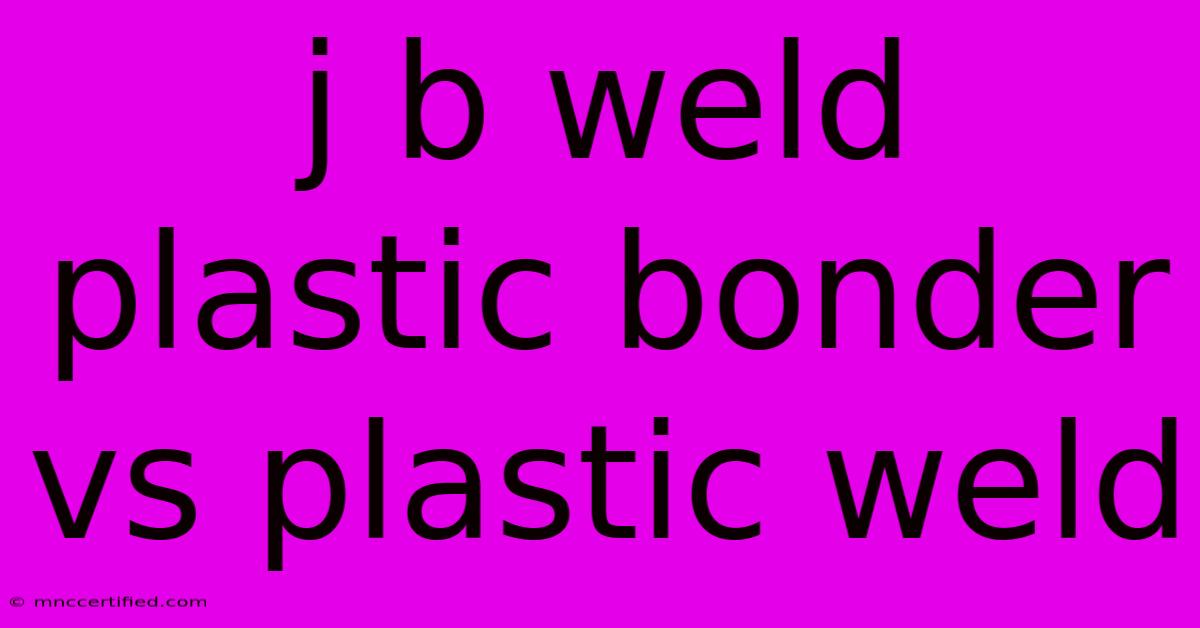J B Weld Plastic Bonder Vs Plastic Weld

Table of Contents
JB Weld Plastic Bonder vs. Plastic Weld: Which One Is Right for You?
If you're looking to repair a broken plastic item, you might have come across two popular options: JB Weld Plastic Bonder and Plastic Weld. Both products claim to provide strong, durable bonds, but which one is the right choice for your needs? This article will explore the pros and cons of each product, helping you decide which one will best suit your specific repair project.
Understanding the Differences: JB Weld Plastic Bonder vs. Plastic Weld
Both JB Weld Plastic Bonder and Plastic Weld are epoxy-based adhesives designed for bonding plastics. However, they differ in their specific formulations and intended applications.
JB Weld Plastic Bonder
-
Key Features:
- Versatile: JB Weld Plastic Bonder is known for its versatility, working on a wide range of plastics, including ABS, PVC, polypropylene, and even some fiberglass.
- Strong Bond: It forms a strong, durable bond, suitable for repairs that require high strength and impact resistance.
- Fast Curing: This product cures quickly, offering a functional bond in a short time.
- Heat-Resistant: JB Weld Plastic Bonder can withstand temperatures up to 300°F (150°C).
-
Pros:
- Wide compatibility
- Strong bond
- Fast curing
- Heat-resistant
-
Cons:
- Can be difficult to sand or smooth
- May not be ideal for delicate or thin plastic parts
Plastic Weld
-
Key Features:
- Specifically Designed for Plastics: Plastic Weld is formulated to create strong, flexible bonds with specific types of plastics. It often works best with polypropylene and polyethylene.
- Easy to Use: It's designed for easy application, making it suitable for DIY projects.
- Flexible Bond: This product creates a bond that's flexible enough to handle some movement and stress.
-
Pros:
- Easy application
- Flexible bond
- Specific to certain types of plastic
-
Cons:
- Limited compatibility
- May not be as strong as JB Weld Plastic Bonder
Choosing the Right Adhesive: Factors to Consider
The best adhesive for you will depend on your specific project:
- Type of Plastic: Identify the type of plastic you're working with to ensure the adhesive is compatible. JB Weld Plastic Bonder has broader compatibility, while Plastic Weld is often more effective for polypropylene and polyethylene.
- Strength Requirements: For repairs that need high strength and impact resistance, JB Weld Plastic Bonder is generally the better choice.
- Flexibility Requirements: If the repair needs to be flexible, Plastic Weld is often the better option.
- Ease of Use: For simple projects, Plastic Weld's easy application might be preferable.
Beyond the Basics: Tips for Successful Repairs
Regardless of the adhesive you choose, follow these tips for optimal results:
- Cleanliness: Ensure the surfaces are clean, dry, and free of grease or debris.
- Roughening: Lightly roughen the surfaces with sandpaper to increase the bonding surface area.
- Proper Mixing: Follow the manufacturer's instructions carefully for mixing ratios and application time.
- Curing Time: Allow the adhesive to cure fully before applying any stress or pressure to the repaired area.
Conclusion
Whether you choose JB Weld Plastic Bonder or Plastic Weld, both products offer a reliable solution for plastic repairs. By carefully considering the factors mentioned above, you can select the best option for your specific needs. Remember, a little research and preparation go a long way in ensuring a successful and long-lasting repair.

Thank you for visiting our website wich cover about J B Weld Plastic Bonder Vs Plastic Weld. We hope the information provided has been useful to you. Feel free to contact us if you have any questions or need further assistance. See you next time and dont miss to bookmark.
Featured Posts
-
Hamas A Threat To Palestinian Progress
Nov 08, 2024
-
Investment Management Firms Philadelphia
Nov 08, 2024
-
Hamas On Al Jazeera Discussion On Murdered Hostage
Nov 08, 2024
-
Trump Appoints Campaign Manager To White House
Nov 08, 2024
-
Lorry Driver Dies In M6 Crash Update
Nov 08, 2024